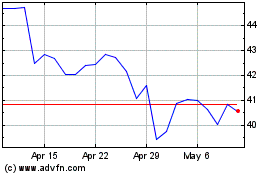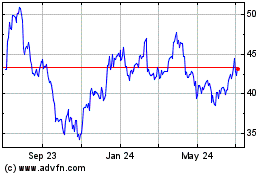Nevada Lawmakers Set to Tackle Adelson's Stadium Proposal
October 10 2016 - 12:10AM
Dow Jones News
LAS VEGAS—Casino mogul Sheldon Adelson, known on the national
political stage as a major Republican-party donor, has a more local
matter on his mind in his adopted hometown: convincing the state
legislature to allocate tax dollars for the $1.9 billion stadium he
wants to build and operate as a new home for the National Football
League's Raiders.
The proposal has a chance of passing the Republican-led
legislature this week, as the governor has called a special
legislative session starting Monday to consider a plan by Mr.
Adelson, who owns Las Vegas Sands Corp.
The effort to bring the second major-league professional sports
team to Nevada so far has included rallies featuring Raiders fans
and a cameo appearance by soccer star David Beckham at a meeting of
the Southern Nevada Tourism Committee last April.
"Thank you all for the offer you are bringing to us," Las Vegas
Mayor Carolyn Goodman, a Democrat, said to Raiders owner Mark Davis
and others representing Mr. Adelson. "Bravo."
"I didn't know we were so popular and I don't think it's us,"
said Tourism Committee board member Bill Hornbuckle, president of
Sands rival MGM Resorts International.
The warm welcome is unusual for Mr. Adelson, who has long been
at odds with many powerful political forces in Nevada., despite his
deep pockets and influence on the national stage.
Yet, the domed-stadium proposal remains controversial and
unlikely to sail through the legislature, political observers say.
Critics, which include the main casino-workers union, say, among
other things, there are other priorities that new public funding
could be used for instead of a billionaire's project.
The stadium is part of what may be the biggest-ever push by
Nevada's wealthiest resident to shape politics, business and
community in the state.
Mr. Adelson bought the Las Vegas Review-Journal, the largest
newspaper in Nevada, last year, and is funding a ballot initiative
to break up the main energy monopoly held by NV Energy.
Many of the state's most important interests—including rival
casino owners, construction labor unions and the state university
system—are backing Mr. Adelson's stadium plan.
"This is definitely a maturation of his political instincts,"
said Tick Segerblom, a Democratic state senator who opposes the
stadium plan. "He has been very sophisticated about it."
The proposal being considered by the legislature would increase
the hotel-room tax by 0.88 percentage point in the city's tourism
corridor, sending $750 million to pay off public bonds that would
fund part of the stadium construction. Mr. Adelson personally would
contribute $650 million to serve as developer and operator. (Mr.
Adelson's Sands Corp. wouldn't officially be involved in the
project).
A public entity would own the stadium, but revenue from it would
go to Mr. Adelson's development and operations group. The estimated
annual return to Mr. Adelson, after expenses, would be about $20
million a year, according to Steven Hill, director of the
Governor's Office of Economic Development who chaired a
state-created tourism-infrastructure committee that has proposed
the bill. But Andy Abboud, an Adelson political adviser who has led
the stadium planning, said the amount is expected to be higher.
The Raiders would contribute about $500 million through
season-ticket licensing fees and an NFL loan contribution. The
financing would be dependent on a team moving to Las Vegas.
A spokesman for the NFL said three-quarters of the league's
owners would need to approve such a move. A spokesman for the
Raiders, currently of Oakland, Calif., didn't respond to requests
for comment.
The team has taken out an option to buy a site for the stadium
in Las Vegas, Mr. Hill said. "We are willing to invest in the
project because it creates jobs and tax revenue."
Mr. Abboud said Mr. Adelson is expecting a low rate of return,
but wants to be involved in the project because he believes it
would benefit the community. "It makes us a major-league city," Mr.
Abboud said. "He thinks a rising tide lifts all boats."
Arenas and stadiums traditionally have been difficult to finance
and build in Las Vegas because professional sports teams have shied
away from the legal sports betting allowed in the state.
But sports leagues are starting to soften their stance and the
major Las Vegas casino companies increasingly have become
interested in diversifying their revenue streams away from gambling
and toward big events, nightclubs and restaurants. This year MGM
opened the T-Mobile Arena, which will house a National Hockey
League expansion team starting next year. It will be Las Vegas's
first major professional sports team.
(END) Dow Jones Newswires
October 09, 2016 23:55 ET (03:55 GMT)
Copyright (c) 2016 Dow Jones & Company, Inc.
MGM Resorts (NYSE:MGM)
Historical Stock Chart
From Mar 2024 to Apr 2024

MGM Resorts (NYSE:MGM)
Historical Stock Chart
From Apr 2023 to Apr 2024
